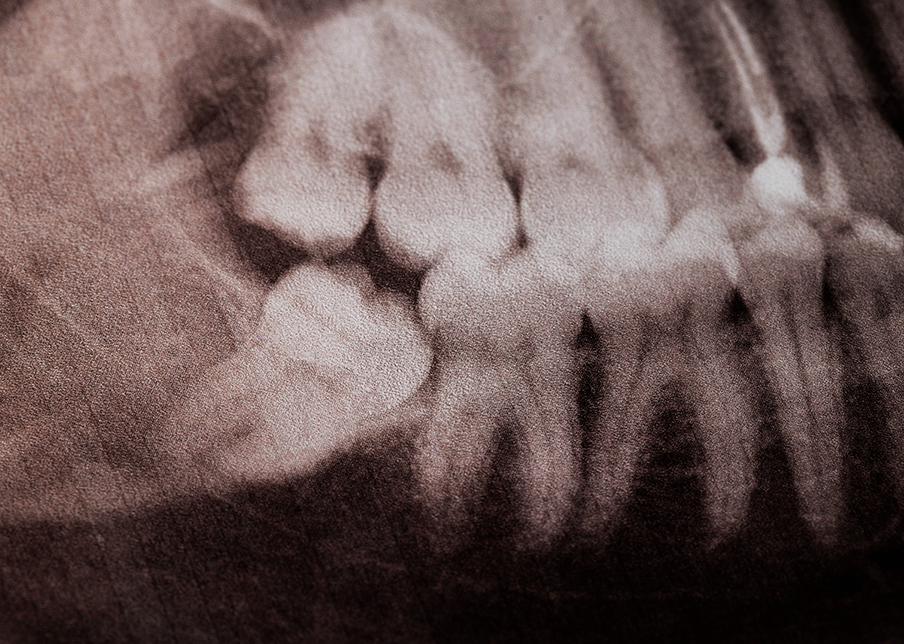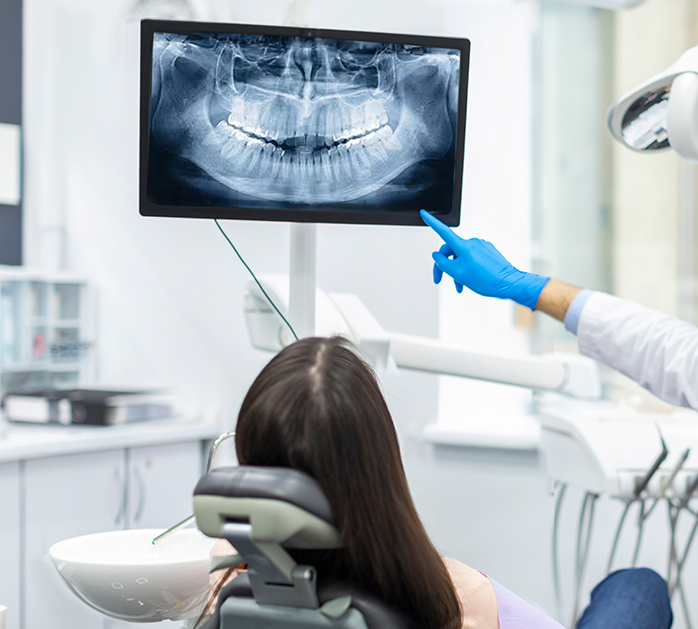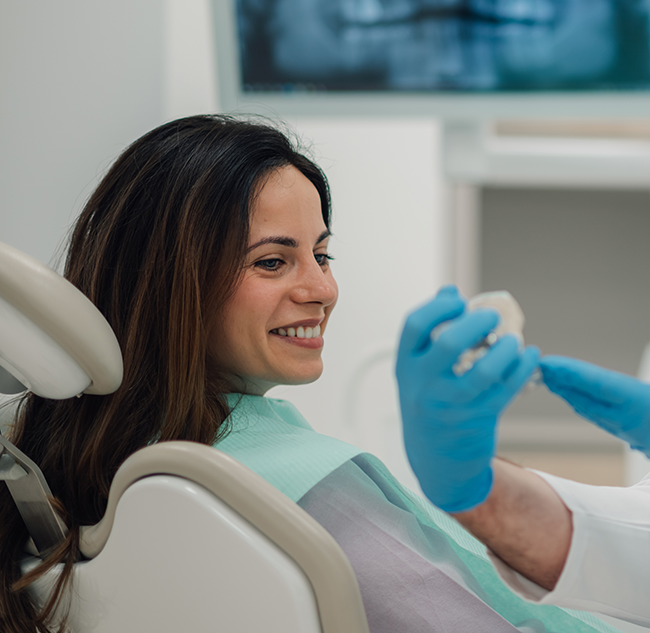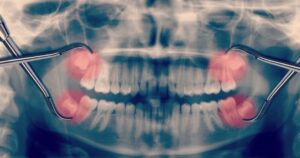
We safely and comfortably remove your wisdom teeth

When wisdom teeth erupt, some people have no complications while others do as a result of an individual’s jaw structure and positioning of their teeth. In the case where an individual has suffered from an impacted tooth, the jaw doesn’t have enough room for the new tooth, and the tooth doesn’t erupt (stays inside the jaw bone). In addition to insufficient space in the mouth, or the misalignment of your jaw, some individuals may have tough gums which can make it hard for the wisdom tooth to penetrate the gum surface.

Impacted teeth can be removed at any age, but it is generally agreed that removing wisdom teeth during the late teens/early twenties is advantageous since the tooth roots may not yet be completely formed, thus allowing for easier removal. Your wisdom teeth can be removed later in life, however, and most patients request removal when their teeth become impacted.
It is often strongly recommended to remove the wisdom teeth to avoid a host of dental issues that can progress into other more serious health concerns. Pain is often the first symptom of impacted wisdom teeth, and is cyclic in type which means the pain will come and go in waves of a period of time, this is known as remission and exacerbation.
Eventually, a range of problems will present themselves if leaving impacted wisdom teeth within the jaw bone including:
For your comfort, if you wish to have your wisdom teeth surgery procedure under a general anaesthetic, Dr Sam Hadjipetrou has visiting rights at St Andrews Day Hospital theatres and would be able to arrange this if needed. Most of the time, this procedure is preferable under general anaesthetic.
At Family Dental Clinic – West End we can safely and comfortably remove your wisdom teeth at any stage in life. If you are concerned about your wisdom teeth of their condition please call our friendly practice to book an appointment for a professional assessment.
View our Post Op Documentation(Extraction) Here


Our photo galleries at Family Dental Clinic – West End all contain genuine patients that have undergone one or more than one of general dentistry, cosmetic dentistry or restorative dentistry treatments. Every image of before or after photos are true and correct, all having been performed in the West End practice located in Brisbane.






Dedicated to creating beautiful healthy smiles using the latest dental technology with precision and care
Wisdom teeth are the last set of molars that typically emerge between the ages of 17 and 25. Sometimes, they can cause trouble if there isn’t enough room for them to grow properly. This can lead to pain, infections, and even damage to nearby teeth. Dentists often suggest removing wisdom teeth in such situations to prevent these issues and promote oral health.

Not all wisdom teeth need to be removed. It depends on various factors, such as the individual’s oral health, the position and alignment of the teeth, and whether they are causing any problems. If the wisdom teeth are growing properly, fully erupted, and easy to clean, they may not require removal.
However, in many cases, wisdom teeth can become impacted or grow at odd angles due to a lack of space in the jaw. Impacted wisdom teeth can lead to pain, infections, damage to adjacent teeth, and other oral issues. In such situations, dentists often recommend wisdom tooth extraction to prevent further complications.
It’s best to consult with a dentist or oral surgeon who can assess your specific situation and provide personalised advice. Regular dental check-ups and X-rays can help monitor the development of wisdom teeth and determine whether extraction is necessary.

Wisdom teeth usually come through between the ages of 17 and 25. While some people may have no problems, others might experience pain, swelling or crowding as the teeth appear. At Family Dental Clinic West End, we check the development of wisdom teeth during regular appointments to make sure they’re not causing issues. If discomfort or complications occur, we offer emergency wisdom tooth removal and personalised care to support your oral health. For professional wisdom teeth removal in Brisbane, our experienced team provides gentle, dependable treatment options tailored to your needs. Contact us today to discuss your wisdom teeth concerns or book a consultation.
It’s a good idea to have your wisdom teeth checked during your late teens or early twenties. Even if there’s no discomfort, problems can arise without noticeable symptoms. Early assessment can prevent complications like crowding, infection, or jaw discomfort. At Family Dental Clinic West End, we recommend regular dental check-ups to monitor wisdom teeth development and address any concerns before they become urgent.
You may suspect that your wisdom teeth are impacted if you experience a range of symptoms. One common indicator is persistent pain in the back of the mouth, jaw, or ears, which can signify impaction. Additionally, swelling or inflammation of the gums around the wisdom teeth is a clear sign that something may be amiss.
You might also notice difficulty opening your mouth or discomfort when chewing, both of which could suggest that your wisdom teeth are causing pressure on surrounding structures. Another symptom is a bad breath or unpleasant taste in the mouth, which can indicate infection or decay associated with impacted teeth.
The most definitive way to determine if your wisdom teeth are impacted is through dental X-rays. A dentist can evaluate the position of the teeth and recommend treatment based on their findings. If you experience any of these symptoms or suspect that your wisdom teeth may be impacted, consulting with a dentist for a professional evaluation is essential.
Wisdom teeth can cause issues when there’s not enough space for them to grow properly. They may press against nearby teeth, become trapped under the gums, or lead to gum infections, pain, or damage to surrounding teeth. In some cases, they can also increase the risk of decay or cysts. At Family Dental Clinic West End, we evaluate your wisdom teeth with a thorough check-up and imaging to determine if removal is needed to maintain your oral health.
Impacted wisdom teeth can lead to various dental issues, which may require attention from a family dental clinic in West End, Brisbane. One common problem is gum inflammation, known as pericoronitis. This occurs when the gum tissue around the partially erupted wisdom teeth becomes inflamed, causing pain and swelling. Bacteria and food particles can accumulate in the area, exacerbating the issue.
Another significant concern with impacted wisdom teeth is tooth decay. These teeth are difficult to clean, making them more susceptible to cavities. Additionally, they can cause decay in adjacent teeth due to the accumulation of food and bacteria between them.
Impacted wisdom teeth can also result in referred pain. The pressure from these teeth can cause jaw pain, headaches, and discomfort in nearby areas, such as the ears and neck, potentially leading to conditions like temporomandibular joint disorder (TMD).
Furthermore, pathological lesions may develop around impacted wisdom teeth, leading to cysts or tumours that can damage surrounding bone and tissue. In severe cases, this can lead to significant complications. Lastly, the pressure from impacted wisdom teeth can contribute to the misalignment of teeth, causing neighbouring teeth to shift and resulting in bite issues. Regular check-ups with a family dental clinic in West End, Brisbane can help monitor and address these concerns.
During the wisdom teeth removal procedure at Family Dental Clinic West End, Brisbane, you can expect several key steps. First, anaesthesia will be administered to ensure you feel no pain during the procedure. Depending on the complexity of the extraction and your comfort level, local anaesthesia, sedation, or general anaesthesia may be used.
Next, the dentist will carefully extract the impacted wisdom teeth. If the teeth are fully erupted, the procedure may be straightforward. However, if they are impacted beneath the gum line or in the jawbone, incisions may be necessary, and some bone might need to be removed to access the teeth.
The entire procedure typically takes about 30 to 60 minutes, depending on the number of teeth being removed and their condition. After the procedure, you will receive detailed post-operative care instructions on managing pain and swelling, caring for the extraction site, and dietary restrictions during your recovery.
To manage pain before an emergency wisdom teeth removal, consider the following steps:
Delaying emergency wisdom teeth extraction can lead to several risks and complications:
“Impacted” wisdom teeth are those that haven’t fully erupted or grown into the proper position. Lack of space can cause them to become trapped, leading to pain, swelling, and potential infections. They can also affect neighbouring teeth. Dentists often suggest removing impacted wisdom teeth through surgery to prevent complications.

Emergency wisdom teeth removal differs from routine removal primarily in its urgency and the context of the procedure. Routine wisdom teeth removal is planned and scheduled in advance, allowing time for a comprehensive evaluation, preparation, and discussion of the procedure. In contrast, emergency wisdom teeth removal is performed in response to sudden complications such as severe pain, infection, or impaction that require immediate attention. This urgent approach often involves quick decision-making to address the immediate issue, potentially with fewer preparatory steps and sometimes under more challenging conditions. The procedure might be done in emergency settings, and recovery might require additional follow-up care to ensure proper healing.
I received absolutely fantastic care from Dr. Georgio and his assistance today. Also was greeted by a very kind reception team. Thanks for the great work team, I look forward to coming back!
Dr Kosta did great work on both my crowns and there was very little discomfort after the second one. Very happy with the service as well from the rece… Read More
Kosta was very good, explaining exactly what my options were and ensuring my comfort all through the procedure. He gave me an aftercare sheet detailin… Read More
Top rate care, compassion, warmth & professionalism. This was my second visit & it’s a relief to find a team so good. Thoroughly recommend Dr Costa & … Read More
I had Dr. Giorgio, he is very kind, gentle, and efficient. He made my teeth look perfect. All the staffs are very friendly.